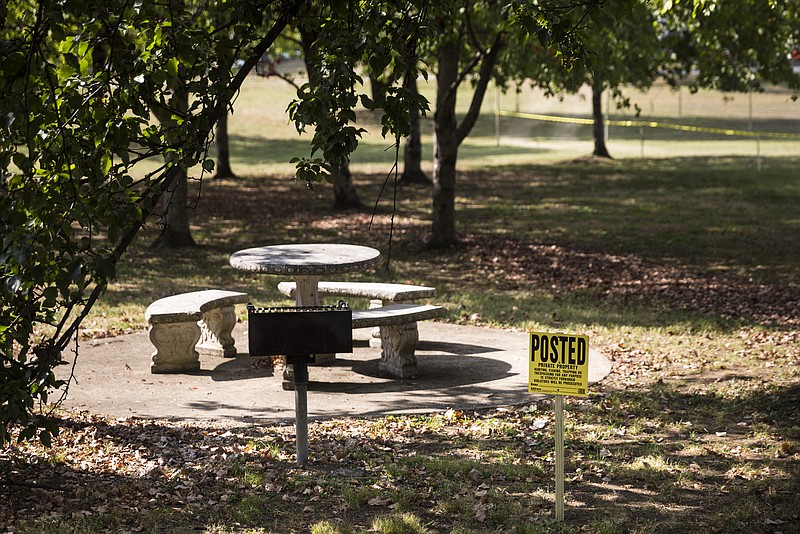A recently released report has determined the city of Chattanooga's proposed Central Avenue extension project will have adverse effects on Lincoln Park.
The report, prepared by New South Associates, a nationally recognized cultural resource firm, is in its first draft and details the effects the project would have on Lincoln Park and puts them in perspective with federal regulations for the protection of historic properties.
New South Associates is acting as a subcontractor to the city's engineering consultants on the extension project. The firm was paid by a mix of federal and city dollars.
Lincoln Park was determined eligible for inclusion on the National Register of Historic Places in 2017 "for its importance in the social and recreational history of the city's African-American population," the determination of eligibility reads.
During segregation, the park was the main center for recreation for the city's black residents, who were barred from nearby Engel Stadium and Warner Park. The park included amusement rides, an Olympic-sized swimming pool, and a baseball field that was host to Negro League stars such as Satchel Paige, Jackie Robinson and Willie Mays.
The park "served as not only a place to play, but as a symbol of pride for the African-American community during a time when other public facilities were denied to them," the determination read.
However, because not all areas of the park retained historical integrity due to neglect by the property owner, Erlanger Health System, a boundary was established to include the portions of the park that met the criteria for historic significance, the New South report states.
Still, a portion of the proposed Central Avenue extension project will pass through that boundary. And since the project - which proposes to extend Central Avenue from Blackford Street to Riverside Drive - is receiving federal funds, it is subject to the National Historic Preservation Act, Section 106, a federal law requiring federally funded projects to identify historic properties, determine what effect the project would have, and if negatively affected to work with stakeholders to resolve any problems.
Lincoln Park qualifies as historic under the act, because it defines "historic" as properties listed in or eligible for listing in the National Register of Historic Places.
The plan now includes three possible designs for how Central Avenue will extend through the property. Two of the three alternatives result in damage to the property, requiring the removal or relocation of the park's historical entrance pillar from its original location. The third veers slightly to the east, leaving a 4- to 6-foot buffer before the road.
But even with that plan, the pillar, which is now on the other side of a park road, would be on the opposite side of a much larger through street, separating it from the rest of the park. That is why the extension would result in a change in the character of the property's use and is considered an adverse effect, according to the New South report.
"The original road through the park was a loop. An important characteristic of the nature of Lincoln Park was that it was a destination," the report states. "It was not on the way to anything else and the park road was of small scale and not a through street to another area of Chattanooga."
Chattanooga Department of Transportation administrator Blythe Bailey said the city's goal is to have an open and collaborative process with all stakeholders, "particularly the residents and businesses who will benefit from increased connectivity and economic vibrancy in this area of Chattanooga."
"We have made a long-term commitment to improving Lincoln Park while protecting invaluable local history and irreplaceable historical character of this neighborhood," Bailey said. "We look forward to refining our designs based on [the] Tennessee Department of Transportation's feedback and moving forward with the next phase of this complex project."
Gregg Gentry, chief administrative officer for Erlanger Health System, said the hospital "is supportive of the efforts of the City and TDOT as they work through the next steps of this Section 106 process."
Community members Tiffany Rankins and Eric Atkins, who is a historian, both said the letter echoes the community's concerns about the Central Avenue extension.
"This validates the concerns the community has had for over five decades," said Atkins. "We question the city's commitment to black history and, indeed, all history in our city."
Rankins said, "The city said it wasn't [historic], the state said it wasn't. We had to go to the federal government" for proof of the community's place in the fabric of Chattanooga.
Plans for the Central Avenue extension project have been in the works since 2011, but the city didn't hold a public meeting with Lincoln Park residents until early 2013, the Times Free Press reported previously.
The project has been a point of tension ever since, with the city agreeing in 2016 to acquire a portion of the property from Erlanger Health System and work with the community to redevelop Lincoln Park.
But while park planning with the community has begun, acquisition of land for the park would not occur until after land for the Central Avenue project has been acquired, the New South report states.
Contact staff writer Rosana Hughes at rhughes@timesfreepress.com or 423-757-6327 with tips or story ideas. Follow her on Twitter @HughesRosana.
